Not Just the Fog of War: Human Suffering and the Failures of the Mainstream Media.
This time, the damage is huge.
The Hospital
The best discussion I’ve seen on MSNBC occurred October 17th on “Deadline White House” shortly after the news “broke”—or perhaps, more accurately, was set ablaze—by the BBC, The New York Times, and other widely read and trusted media sources, as well as social media.
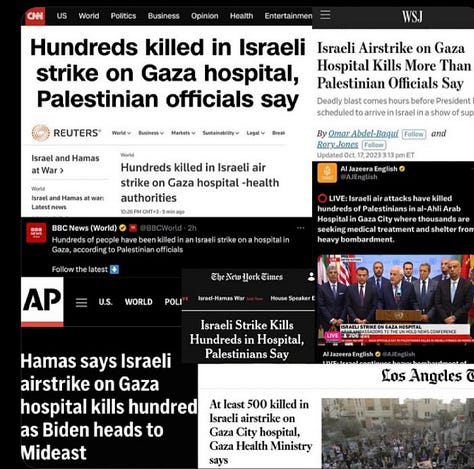

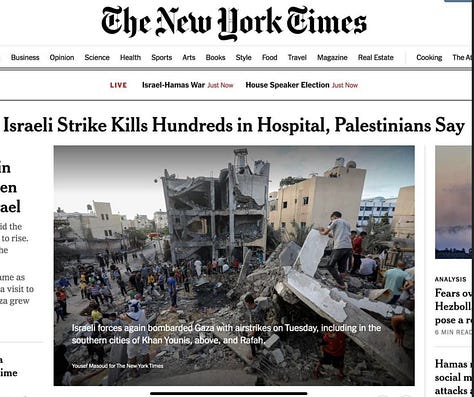
Nicole Wallace had originally intended to use the first segment to promote Rachel Maddow’s new book Prequel—a copy of it was on the table in front of them—but that was shelved and Miri Eisen, former colonel for the IDF and an intelligence and counter-terrorism expert, joined Nicole and Rachel to discuss what was then being almost universally described as an Israeli strike/bombing.
Before I go on, notice in the headlines above that the information about the “Israeli strike” was rarely attributed to Hamas. Instead, terms like “Palestinian Health Ministry,” “Health Authorities,” and “Palestinian officials” made it seem as though some independent government agency had assessed the situation. In fact, there is no such independent entity; Hamas is the governing “agency” in Gaza. Notice, too, that the picture of the decimated building under the New York Times headline isn’t actually of the hospital that was hit. But no matter, it’s an example of the destruction wrought by Israel. Apparently that was close enough for The Times. So what if it doesn’t factually illustrate the headline? So what if the almost after-thought of “Palestinians say” is dwarfed by the incendiary rhetoric of “Israeli Strike Kills Hundreds”?
Miri Eisen knows quite a bit about how Hamas operates. In obvious distress over Nicole’s opening, which employed all the by-then familiar phrases—“deadly strike” on “Palestinians seeking shelter” and so forth—along with scenes of multiple protests, she struggled to stay calm, as she criticized Nicolle and Rachel for “amplifying” Hamas’s claims.
She described how when she first had heard about the hospital, she was as horrifed as every one else. “Oh my God, have we done something so horrible?” The evidence—which was already accumulating on social media, though ignored by the mainstream media: videos of rocket trajectories, taped Hamas conversations, and analyses of the physical damage—suggested that Hamas’s account was false. But the stark, bold headlines, videos of injured Palestinians, the messaging from Hamas and the American “progressives” who viewed the terrorists as “freedom fighters,” had created a “spiral” of global acceptance that Israel had attacked the hospital, a spiral that was disrupting, upending and utterly displacing any sympathy for the victims of the October 7th massacres.
Miri was familiar with this kind of “psychological warfare.” She didn’t believe the Palestinian Islamic Jihad had meant to bomb the hospital, she suspected it was a misfire, but Hamas’s exploitation of the disaster had hit its target—more than they could have dreamed. “The hospital was hit by something. And that's what we're all showing right now. And worldwide, it's Israel to blame.”
Particularly upsetting to Miri (and to me) was the mainstream media’s apparent belief that “when Hamas gives out information it's something reliable.” I would add that the same credulity certainly hadn’t been extended to Israeli accounts of terrorist torture and slaughter of babies. As Nicolle herself pointed out in a later show there’s been a disturbing asymmetry of skepticism there—one that doesn’t seem innocent of the current of anti-Israeli, and perhaps anti-Semitic mistrust that keeps bubbling up out of the swamp of the cultural unconscious. How easily we slid, not just in the eyes of the Arabic world but in the mainstream press, from being the sadistically terrorized to being portrayed as murderers as ruthless and deliberate as the terrorists themselves.
Nicolle, bless her, did not take offense at Colonel Eisen’s “rebuke” (Nicolle’s word) for amplifying the “spiral” of images and messages that—whether or not Nicolle thought this (and I don’t believe she did)—had indicted Israel and inflamed anti-Israeli sentiment. She digested everything Miri had said thoughtfully, and agreed that there was a huge problem in “the deployment of images, the inability to understand if they're part of a geopolitical, I guess in this case, it isn't geopolitical. It's a terrorist campaign, a terror campaign to continue to terrorize Israel and to cleave off support from its allies.” My tension lessened a little, and so did Mira’s. For once someone seemed to understand that remaining steady in condemnation of Hamas was not equivalent to being “anti-Palestinian.” Most of the mainstream media hasn’t seem to get that, as they fall all over themselves drawing equivalences—sometimes purely visual, sometimes discursive (as in: “True, we can’t trust Hamas to tell the truth, but we can’t trust Israel to do so either”—something I heard numerous times) between the actions of Hamas and the actions of Israel.
Miri:
“This is a horrific war. It is an unprecedented one. And part of what's going on within this war is that war of social media and of images. It can be of the hostage and the different Israeli hostages. And it can be the cynical, horrific use of something like this [the hospital] against Israel to get world opinion against us. Everybody is talking about the humanitarian disaster in the Gaza Strip.
And my heart can go out to the people in the Gaza strip. But I haven't seen the Hamas who are hiding behind their own people who for two years prepared this attack, and didn’t prepare anything to take care of their people. No, they want to ues them as human shields. So my heart can go out, but I also have to be realpolitik. That [Gaza] is where Hamas is located. That is where they are hiding behind.”
The “Two Narratives” Construction
A bit later in the same episode, on-location reporter Raf Sanchez attributed any “confusion” to what he described as “an absolutely classic fog of war situation.” He didn’t address the issue that Miri and then Nicolle had raised about the possibility that the “Israeli strike” was a cynical exploitation of the situation by Hamas. Instead, he did what reporter after reporter has done since Israel objected to Hamas’s reports: First, he reduced the situation to “competing narratives,” as though each claim was equally compelling (or perhaps imagining he was in a Lit Crit class instead of a war zone.) Then, although he maintained that none of the evidence for the Israeli “counter-narrative” had been “made public” (not true; it was all over the internet) the “fog of war” lifted enough for him to present his own argument against it:
This kind of death toll is not what you normally associate with Palestinian rockets. These rockets are dangerous. They are deadly. They do not tend to kill hundreds of people in a single strike in the way that Israeli high explosives, especially these bunker buster bombs that are used to target these Hamas tunnels under Gaza city, do have the potential to kill hundreds of people.
He then went on to question Israel’s honesty (but interestingly, not to question Hamas’s):
And we should say finally, that there are instances in the past where the Israeli military has said things in the immediate aftermath of an incident that have turned out not to be true in the long run. And the one example I'll give you is that when the Al Jazeera journalist, Shireen Abule was killed in the occupied West Bank, the Israeli military initially said that she was killed by Palestinian gunman. And it was only months and months later that they admitted that it was likely an Israeli soldier who fired the fatal shot.
I can’t begin to count the number of times Shireen Abule has been produced to question Israel’s account of the hospital disaster. Did it happen? Yes. It is enough to put Israel’s reliability on a par with that of a terrorist organization that routinely employs disinformation as a PR tactic? I don’t think so. As for the “wrong kind of rocket” argument, it’s now been decisively countered—but not before Raf and others offered it multiple times—by the fact that, having just taken off, the Palestinian rocket was still filled with fuel, and thus capable of producing a highly destructive conflagration in the parking lot where it landed. In fact, examination of the damage done around the hospital proves the very opposite of Sanchez’s argument to be true:
Photos from the following day also appear to show little damage to the hospital buildings, and a relatively small blast zone from the explosion. That damage pattern is inconsistent with a large air-dropped bomb, which would leave a crater and create a shockwave that would damage or destroy surrounding structures, says Marc Garlasco, a former targeting officer for the U.S. military who now works for PAX, a Netherlands-based non-profit.
"It's very clear to me that this is not an airstrike." Garlasco says. Israeli bombs typically leave craters three to ten meters in size, and are designed to create a large shockwave that propels shrapnel over a large area.The lack of both shrapnel damage and structural damage to the hospital is inconsistent with all types of commonly used Israeli bombs and artillery shells, he says.
Nicolle liked the “fog of war” metaphor. But she pressed Sanchez, not about his “rocket” evidence (which she had no way of assessing) but the sheer implausibility that Israel would have done something so stupid and self-destructive as to attempt a deliberate strike against Palestinian civilians seeking shelter in a hospital parking lot, and thus in all likelihood turn the whole world against them—or at the very least disrupt President Biden’s planned meetings with leaders of the Arab world.
Why on earth would Israel do such a thing? It made no sense, not even (or perhaps especially even) if you had the lowest, darkest view of Israel. But this simple bit of reasoning—you didn’t need to know anything about rocket trajectories or craters caused by blasts to recognize the absurdity of Israel deliberately making itself a villain on the world stage—hadn’t been raised by commentators before Nicolle and—amazingly—it didn’t get raised again during all the conversations held on all the MSNBC evening shows. Weren’t these people using their brains? Did they imagine Israel’s bloodlust to kill Palestinian civilians was so great as to risk—not, not risk, insure—the loss of any sympathy from the rest of the world?
Sanchez, although claiming to be an innocent wandering through the “fog of war” was so, so smug about his rocket knowledge. And when Rachel asked him about whether U.S, intelligence had any independent evidence for Israel’s claim, he said he didn’t know—but couldn’t resist reminding Rachel that “the US and Israel are best of friends.” Implying what?
Correcting the Record?
“The point of doing good journalism is that you pause to get the facts straight and hesitate before trusting the word of a terrorist group—in this case, the Hamas-run Gaza Ministry of Health—or a government. Yet, for some reason, when it comes to Hamas, all the old rules are out the window. And whatever the facts are, that breaking news alert—Israel targets a hospital, hundreds of death—is already echoing throughout the world.” (Bari Weiss and Oliver Wiseman, “When the Misinformation Comes From Inside the House”)
We’re now pretty sure what the facts are. At the very least, the fog of war has lifted enough so that the attack on the hospital “appears the result of an errant rocket fired by a terrorist group in Gaza.” This statement of Biden’s was also the assessment of the U.S. Defense Department and was echoed yesterday by the Senate Intelligence Committee, with a Democratic majority, and the House Intelligence Committee, with a Republican majority. “While we continue to collect information, our current assessment, based on analysis of overhead imagery, intercepts and open source information, is that Israel is not responsible for the explosion at the hospital in Gaza,” White House National Security Council spokesperson Adrienne Watson said.
And what does The New York Times have to say about its contribution to the protests erupting throughout the world? Having gone through several different revisions of its original headlines with the same heart-wrenching photo illustration, on October 19 it finally produced one that represented what Raf Sanchez, as recently as last night, was still calling the “counter-narrative.”
No picture of human suffering illustrating this one, but a photo that couldn’t have been better designed to inflame the anger of those who, despite the evidence, held fast to blaming Israel—and now were protesting against the United States as well. Interesting, isn’t it, how much less dramatic this latest headline is. Interesting, too, that “U.S. Says” opens the headline rather than ending it, as “Palestinians Says” did in the original. I don’t believe it’s because The New York Times is skeptical about the U.S. account. I believe it’s because in a subtle way, the paper is defending its earlier headline—by not explicitly, directly refuting it. Why doesn’t the headline read: “Failed Launch by Palestinian Group Caused Hospital Blast, U.S Says”—thus foregrounding the revision—and its own rush to judgment?
It’s typical that when the print media retracts a story, it buries its retraction deep in the innards of the paper. This isn’t exactly a burial. But it is an evasion of responsibility.
That was made even clearer when Helene Cooper, Times reporter, appeared on yesterday’s (October 18) “Deadline White House.”
Nicolle Wallace opened with a clear, straightforward updating of the facts:
“Last time we were together, we had few concrete details outside of what our colleague Raf Sanchez reported was the “fog of War.” Today, there's some developments and updates and clarity to share with you, two senior US officials telling CBS news that it was a rocket, but not fired from Israel. Instead, it was fired from and by a Palestinian Islamic Jihad group. Now that group misfired and hit the hospital.
We should be clear, this Palestinian Islamic Jihad Group is a designated terror group, so designated by the United States government and others. Israel concurs with this assessment, the IDF today releasing this aerial video of the hospital, which they say shows the location of the failed launch on the part of the Palestinian Islamic Jihad Israel also claims to have audio intercepts, which suggests that Hamas knows that Israel isn't and wasn't ever responsible for the tragic loss of life. But the Palestinians, absent any evidence and perhaps for the purposes and fact of just what you see on the screen, are blaming Israelis and Israel still, even as we speak, protests are spreading not just throughout Gaza, but in other parts of the world as well….
Let's bring in New York Times, Pentagon correspondent Helene Cooper and former chief of staff at the C I A and the Department of Defense, Jeremy Bash.”
Helene Cooper almost immediately began to defend The New York Times—although Nicolle hadn’t mentioned the paper’s rash mistake—implying, outrageously, that the new “narrative” might be the rush to judgment, and questioning Biden’s motives for backing it: [The bolded emphases are mine.]
“Hi Nicolle. Thanks for having me. So the US has been very quick to come out and with their intel assessment saying basically that this rocket was not fired by Israel. It was fired by the Palestinians. The reason why is, as you alluded to earlier, protests are, are spreading like lightning across the Middle East over what people in the, the Arab world view, most people view as an atrocity.
…The Biden administration very much does not want to see this turn into like a global firestorm against the Israelis. And so for that reason, they've been very quick to declassify the American intelligence. In the past, as you've seen with the Ukraine war, sometimes they take some time to declassify intelligence.
But this they came up with with very quickly.Our sources are telling us that they use three different strains of intel. One is what they got from the Israelis themselves, which are these intercepts that the Israeli, that Israeli officials have given to American officials of what they said are Palestinian fighters and Hamas fighters talking about a mistake mistaken rocket launch. That's one strain of intelligence and that's coming from Israel.
The other two are open source. One of them is open source reports, and that basically means videos from reporters on the ground, people on the ground who tweet that sort of thing. The third one, and which is probably the most verifiable is American infrared data itself that the American officials say shows the rocket being fired from inside Palestinian positions, not from Israeli military positions.
But this is all happening, you know, really, really fast. And they're dealing in immediately with some degree of skepticism that is bound, that was bound to come. And part of the reason for that is because Israel does have, as many critics have pointed out, there have been times in the past where Israel has said that strikes were, were launched by Palestinians that turned out to be Israelis. One example is a year ago May, the May 11th, for instance, killing of the Palestinian American journalist Shireen Abu Al. After she was killed IDF initially said that she was killed by Palestinians. It turned out after many news organizations, including I think your own Nicolle, did investigations to show that she was killed by Israeli mil. The shots that killed her came from Israeli military positions. So that doesn't help at all. “
[SB: Happening really, really fast. Really fast. A lot of it coming from Israel. Really fast. Not wanting to ignite protests. Ans all happening really, really fast. And met with some skepticism, because, of course, well….you know about Israel and that journalist. (Wonder when someone is going to produce a different example?) ]
At this point, Nicolle turned to Jeremy Bash, and asked him what he thought about “the spread of information and disinformation that's jeopardized Jewish Americans.” His lips were tight and he was clearly angry:
I think the news media has to hold the mirror up to itself in this moment because if it weren't for headlines that said Israeli Airstrike Strikes Hospital, there wouldn't be people in the streets outside us embassies threatening our own people and inflaming tensions in the Middle East. And so I blame the journalists and the headline writers who rushed to judgment without any facts at all. And worse, actually, they took the word of the health ministry in Gaza, which is of course a Hamas run health ministry. … It's absolutely irresponsible.
Helen wasn’t happy with this, and retreated to a version of the “fog of war” explanation, embellished by “emotions were running high.” (As usual, “on both sides,”)
“Yeah, it's such a complex thing to cover. As I was listening to Jeremy, I know how careful the New York Times is about this sort of thing… It's such a, an incendiary time and tempers are really, really fraught.
You have, on one hand you have these Israeli people who have just gone through this horrific, horrific attack at a time where they've been so focused for so long on Iran, Iran and Iran, and all of a sudden they get this homegrown attack at a time where they weren't expecting it. That's gonna do something to your psyche. You also have these strikes now that are undoubtedly hitting Palestinian civilians and flaring up tensions there.
So it's a really raw time on whether you are American, whether you're an Israel supporter, whether you are concerned for the Palestinians or whether you're an Israeli citizen yourself. And every this, this, the level of emotion that is at play right now, I think may means that you're gonna see these kinds of, of tensions and flares erupt all over the place. And I think it is incumbent on the news media to be careful that we're not doing anything that further exacerbates the situation.”
[Which is exactly what it did.]
Jeremy wasn’t so easily appeased:
“I can hear you, but I just, I need to point out I'm sorry, but please. I mean, I'm looking at a headline from the New York Times on the website that was subsequently changed that said Israeli strike kills hundreds in hospital Palestinians, say now what that headline says, blaring across the entire top of the, of the website….
When you say Israeli strike kills hundreds in hospital, that is BS, that is wrong. And it wasn't Palestinians, it was Hamas that said it. Hamas that said it.Why would we…why would any clear thinking journalists say, well, Hamas said that the Israelis or the Jews or whoever did something, why would we put that in the newspaper?
And by the way, I'm not defending Israel's actions. I'm just saying that as an American, as someone who cares about American national security, as I see these images of people protesting in the street outside of our embassies and having world leaders cancel a meeting on the president because the media botched this entire story. I mean, I think there's some real, there's some real analysis that people have to do about journalistic integrity. “
Nicole then stepped in to play (as she put it) “traffic cop” and would up making her trenchant point about the “asymmetry of skepticism” towards Palestinian and Israeli reports and images:
“I read through the stories and they were much more nuanced than that headline. I saw that headline as well. Jeremy don't think it's there right now at 4:15 because I think the Times has since altered the story. But I take your point, And, what happened after that story was reported that way was the very consequential impact on the president's trip, which I'm sure might have been in more, more flux than any of us will know for, for a bit that Jordan canceled, MABAS canceled.
I mean, it did have have an impact on, on his trip. And it turned out by this morning, our time, we knew that it was Islamic Jihad. And, and I guess I'm asking both of you because I feel like the good faith pursuit of truth is something that, that we all share. And, and I just wanna put it out there that the biggest struggle, the three biggest struggles I think so far are the heinous nature of the slaughter from 10/7 is impossible to figure out how to cover. Right? I looked at the pictures that the Israeli government released and I traumatized some of my staff because I thought it was important to see what had happened.
We ended up broadcasting one of those pictures. I I have learned and read about the skepticism with which the images of slaughtered infants was received in, in some corners. And I too saw the headline that Jeremy saw yesterday, Israel Strikes Hospital Palestinians. It feels like there is an asymmetry of skepticism. And I, and I wonder, Helene, how you solve for that.
Helene, though, continued to defend her paper, ignoring Nicolle’s point and “taking issue” with the “whole idea” that the Times had simply accepted the word of Hamas:
“It was not only Hamas who said it, there were other Palestinians who said it as well. We had reporters who were there, who spoke with Palestinians, spoke with Hamas, and spoke with other, other groups.
I don't think this was a perfect headline by any stretch of the imagination, but I don't think it merits the sort of response that it's getting from Jeremy.
I do think that the headline could have been better, and I think it probably, you know, I think that, I'm sure the New York Times is doing many, many after, after action reports, but I don't think you can, you, you can selectively read what parts of the headline you want to and ignore the rest. The fact is it was attributed to Palestinians. “
Jeremy wasn’t buying it:
“Well, unfortunately, Hamas is the government in Gaza. So a mini health ministry in Gaza is of course owned and controlled by Hamas. I mean, we know that they, they they have, let's just review the history in 2005 and the, and 2006 when the Israelis departed Gaza, there was an election there, Hamas took over. And since then they've owned and control every single ministry. So every Palestinian spokesperson in Gaza from a ministry is by definition Hamas, the organization that committed this terrorist attack.
So I think journalists and media organizations have to be extraordinarily careful and skeptical and, and judicious when attributing anything to Palestinian authorities, leaders, ministry officials in Gaza, period, full stop. And any, as for other Palestinians who might've been in the West Bank, they were in no better position to judge the situation than Israelis were, in fact, maybe even worse position. So again, this was in a very unfortunate situation and I, I wouldn't just kind of make a big deal about it if I didn't think it had real world consequences.
It has had real world consequences. It's made the idea of keeping this crisis contained, calm, you know, clear heads, preve, clear heads prevailing. It's made that much, much harder. And I just think we need to do, do better going forward. “
Helene:
“I think it is a good conversation to have. I think as journalists, we have to hold ourselves to the highest standards, especially when you're writing about this issue, which is, is so emotional on so many different sides. And I think we should welcome this kind of criticism. But I also think that the idea of this is all the press's fault is a little bit, I think that's quite naive. “
I hadn’t heard Jeremy claim it was “all the press’s fault.”
I’ve yet to hear one other commentator besides Nicolle Wallace address her “asymmetry of skepticism” concern—or raise the common-sense question of what possible motive Israel could have had for targeting a hospital.
And even as late as last night (October 19), all the MSNBC anchors were still presenting the “competing narratives” scenario and describing the Israeli account as “unconfirmed.”
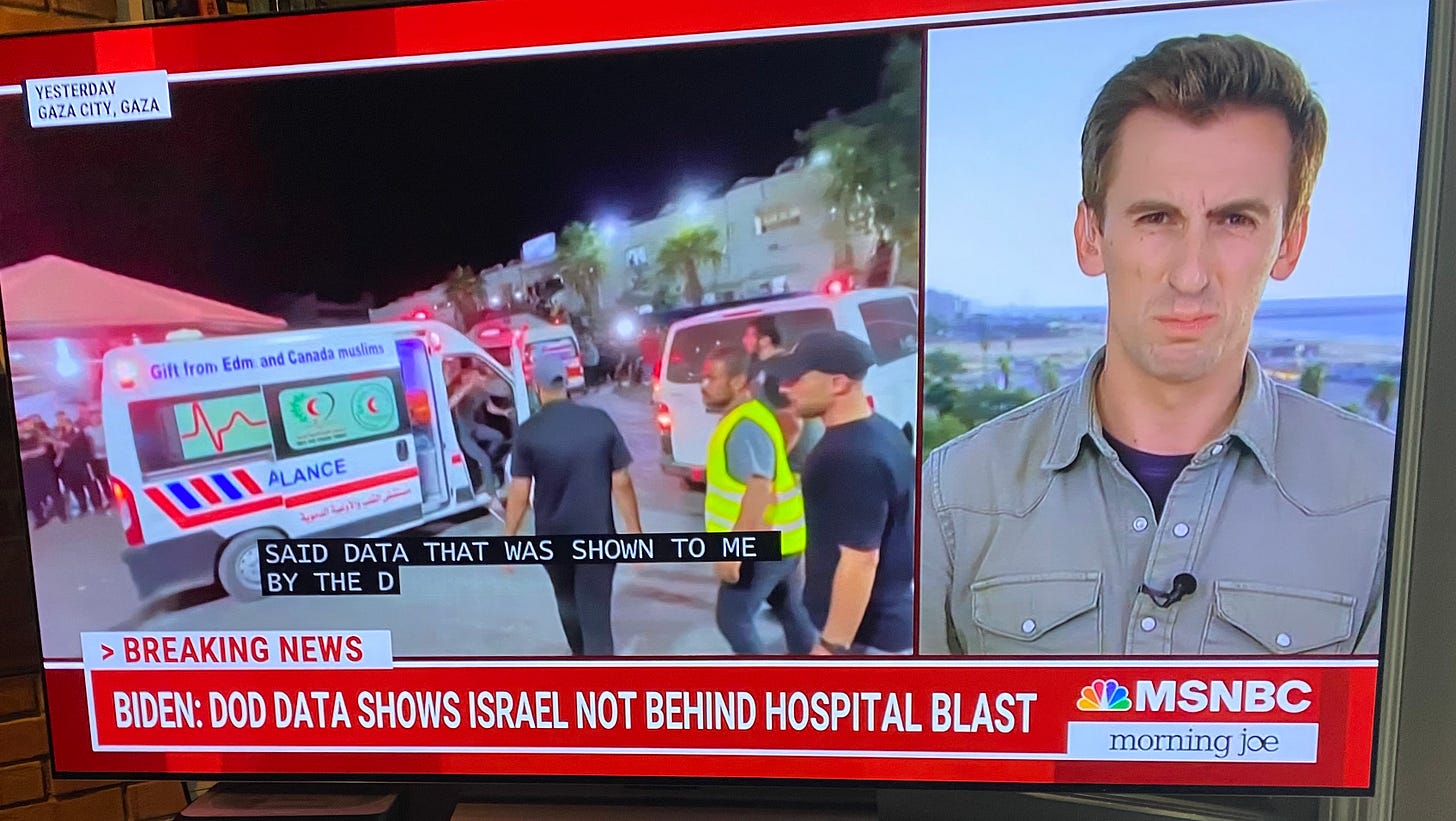
PostScript: Me
What I’ve presented above is not an argument for Israel’s military actions in Gaza; nor is it “anti-Palestinian.” The fact is that I wish Israel would call a halt to its air strikes and proposed land invasion—not because I don’t think Israeli has every right to defend itself, and not because my heart isn’t continually pounding over the misrepresentations, historical ignorance, and anti-Israeli BS that I encounter on social media every day.
I want Israel to stop simply because the presence of Hamas is too threaded throughout Palestinian life, from physical structures like underground tunnels to “official” organizations to ideological mind-control, to be isolated and eliminated through military action.
Let’s not forget, too, that the Hamas are obsessively anti-Semitic terrorists, not benign guardians of the Palestinian people. Killing them, particularly if the toll on innocent human life is great—only seems to multiply their ranks, in no small part because they are perfectly willing to sacrifice their own people to achieve their goals. The images of suffering Palestinians are wrenching to us, but Hamas couldn’t care less about Palestinian lives; it’s happy to provoke Israel into actions that it know will cause death and suffering in Gaza so long as it will help march the Jewish people over a cliff to their total destruction.
Why doesn’t every news story remind the world of that? Why isn’t every image of a suffering Palestinian accompanied by a caption reminding us of that?
I’m a learner, not an expert, when it comes to the Middle East. I’m like a lot of secular American Jews who are the children of immigrants: I grew up with a lot of “embodied” Jewishness but no identification with Israel. I have far more knowledge of the Holocaust (and far more knowledge of how to make great matzoh balls) than Israeli history. But I’m well acquainted with anti-semitism, in both its “polite” and murderous forms. And I know it when I see it. And I know it when I feel it.
I’m feeling it every day now, and not just from the marchers and the murderers, but in the arguments, facial expressions, and headlines of commentators that I used to like and who fancy themselves “progressive.” They believe they are just “reporting” the news but something more leaks out of their false equivalences, their “asymmetries of skepticism,” the labels (“occupiers,” ‘land grab,” “genocidal”) that pop up in their descriptions, their urgency to counter every defense of Israel with (usually historically ignorant) objections.
I’m a learner when it comes to the specifics of the Middle East. But I’m a maven when it comes to the media. And Jeremy Bash is right. Both broadcast and print news needs to take more responsibility for the narratives they produce and the biases (some unconscious, some not) that are carried by them. I’ve written a lot about this in connection with the 2016 U.S. election—two books and many articles, some of which I turned into substack posts. But the creation of fictional scandals, even a fictional “Hillary Clinton,” can’t compare with the “amplification” of Hamas’s creation of a fictional Israel that would deliberately aim its rockets at a hospital packed with civilians.
No, it’s not “all the press’s fault.” But they need to own their part. And they need to do better.

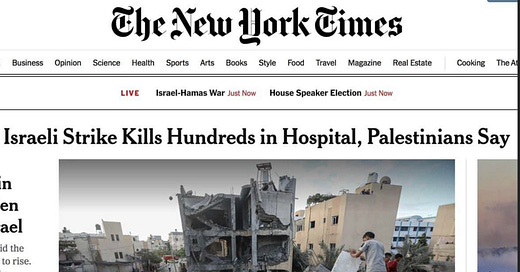



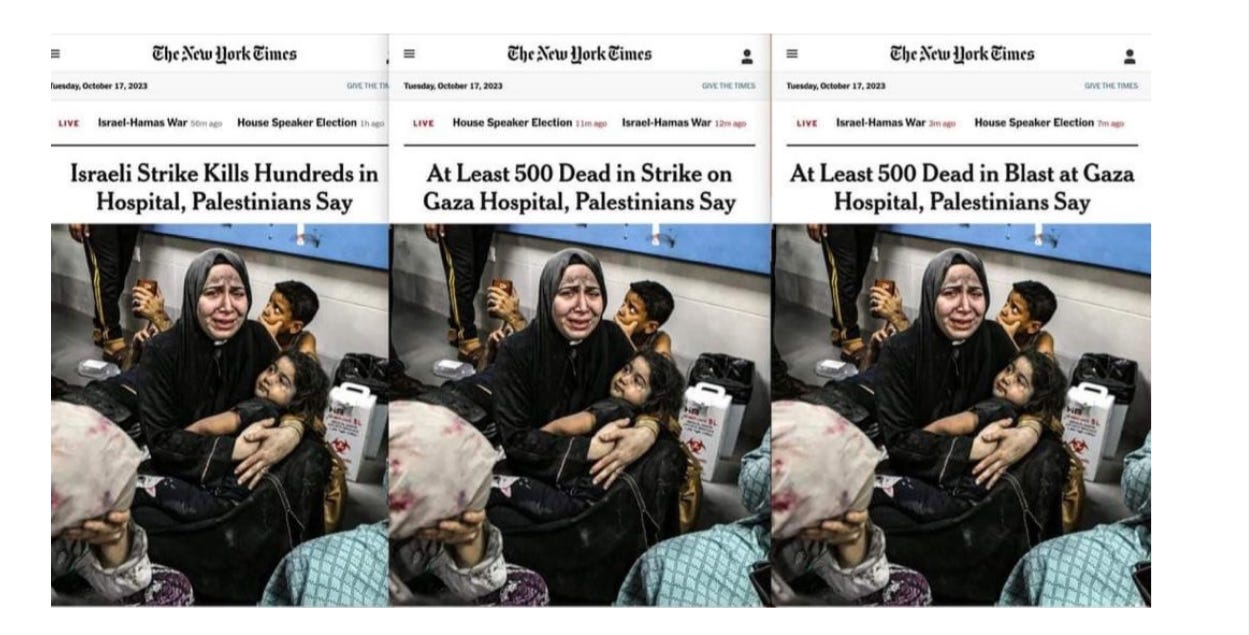
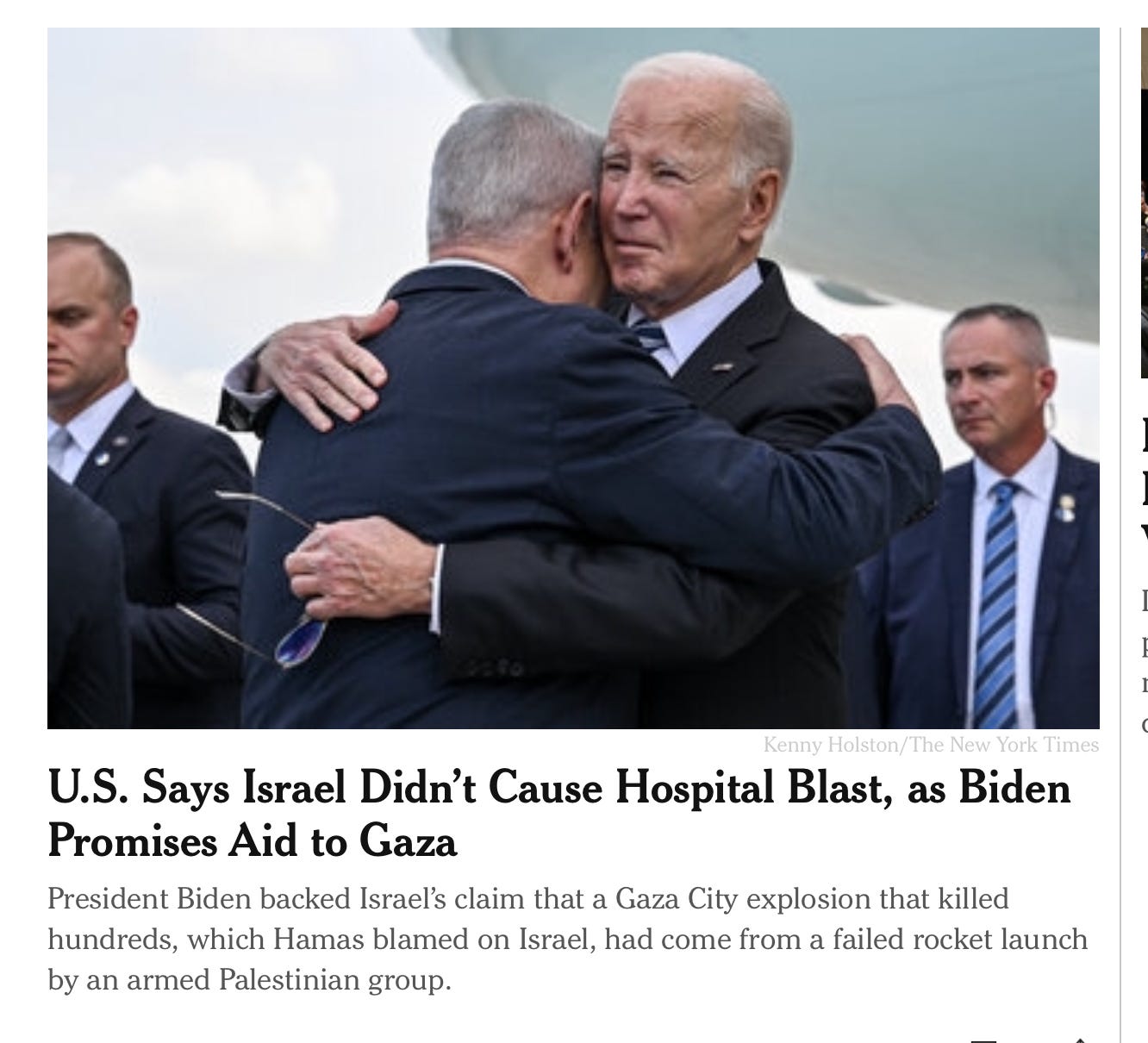
Veronica: Thanks so much for the paid subscription and the lovely message!
The murderous terror assault by Hamas on Israel was the worst terrorist attack on a democratic country since 9/11. In fact, proportionate to population, the death toll from these attacks is about six times worse than 9/11. Those of us over 30 remember the Bali bombings of 2002, when Islamist terrorists killed 88 Australians. Imagine a terror attack on Australia which caused 4,000 deaths. That would be equivalent to what Israel has undergone in the past week.
One of the standard responses to this assault has been to assert that Israel has the right to defend itself. The United Nations Charter gives all sovereign states that right. Ukraine is exercising that right, right now, in the face of Russia's illegal invasion. But Ukraine's situation is very different to Israel's. Russia has launched a conventional military invasion, which Ukraine is resisting by conventional military means. Apart from Russia and its apologists, no-one seriously disputes Ukraine's right to resist Russia's invasion.
Israel, by contrast, has faced an attack by a non-state actor, Hamas, which has seized control of a territory, Gaza, contiguous to Israel, and used it to launch repeated missile offensives against Israeli cities, and now a full-scale terror assault on Israeli communities. In these circumstances, what does it mean to say that "Israel has the right to defend itself"? Does it mean that Israel can fight off (or kill) the terrorists that attacked it, but cannot touch them or their commanders in the territory they control? That is a recipe for endless repeats of what we have seen over the past week.
The right to self-defence is not a purely passive right, a right to react when attacked. The stated purpose of Hamas is the destruction of Israel and the death of every Jew in Israel – indeed every Jew in the world. The experience of the past decade, culminating in the events of last week, shows that Israel cannot defend itself against an existential threat of that kind unless Hamas is destroyed. That is the mission Israel has now undertaken.
Contrary to the repeated assertions of Israel's legion of critics, the Israel Defence Force does not deliberately target civilians.* It targets terrorist infrastructure. But because Hamas chooses as a deliberate strategy to embed its terrorist infrastructure among the civilian population of Gaza, Hamas cannot be destroyed without causing civilian casualties. Hamas fires its rockets from schools and hospitals and mosques, so that Israel will be forced to bomb these sites to stop the missile attacks. Hamas in fact wants civilian deaths in Gaza, so that it can display its "martyrs" in front of the world's media and anti-Israel NGOs like Amnesty.
Everyone who has repeated the statement "Israel has the right to defend itself" will now have to remain resolute in support of Israel’s decision to exercise that right in practice over the coming days and weeks. Whether Israel decides on a land invasion, or confines itself to air attacks, there will be a lot of deaths in Gaza. Israel's friends will need to stress, in the face a concerted anti-Israel propaganda campaign, that responsibility for every death that occurs in Gaza lies with Hamas, and also with the Iranian regime which sponsors and bankrolls Hamas.
* If you believe Israel does target civilians, or is engaged in "collective punishment" in bombing Gaza, consider this. Gaza is a densely populated urban area, with no air defences and no air-raid shelters (because Hamas does not allow them). Israel has among the most powerful and sophisticated armed forces in the world. It has complete control of the air over Gaza. If Israel chose, it could reduce the whole of Gaza to rubble in a few days and kill most of its population. Clearly that is not what Israel has chosen to do.
Although currently available statistics are not very reliable, they bear this out. According to al-Jazeera, Israel has dropped 6,000 bombs on Gaza this week, and has killed 2,700 people in doing so. That is, Israel has had to drop 2.2 bombs to kill one person. Does anyone seriously suppose that the Israeli Air Force is as incompetent as that kill-rate suggests? These figures can only mean that Israel is actively trying to avoid killing civilians.